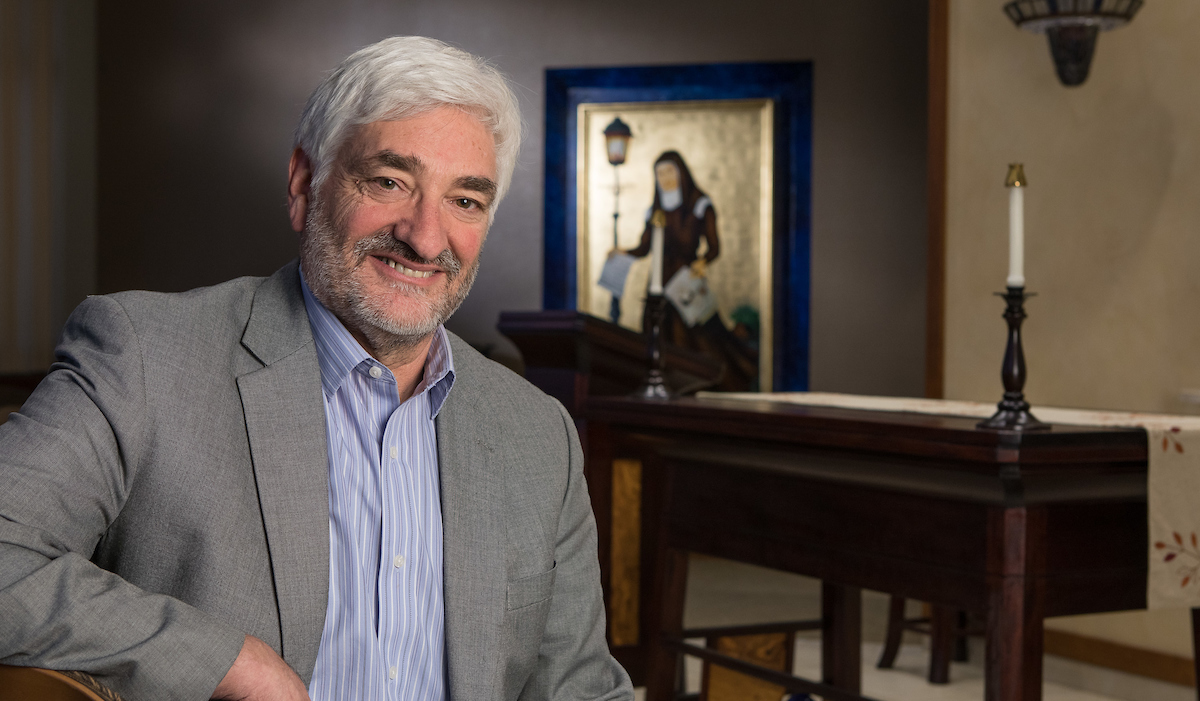 DePaul's Ken Butigan is a key organizer for Campaign Nonviolence, a movement to mainstream active nonviolence and support the long-term process of abolishing war, ending poverty and healing the planet. (DePaul University/Jeff Carrion)
DePaul's Ken Butigan is a key organizer for Campaign Nonviolence, a movement to mainstream active nonviolence and support the long-term process of abolishing war, ending poverty and healing the planet. (DePaul University/Jeff Carrion)
For more than three decades, Ken Butigan, a senior professional lecturer of peace, justice and conflict studies at DePaul, has organized movements for social transformation centered around nonviolence. Read on to learn more about Butigan and how he's working with the Vatican to revitalize and further integrate nonviolence into the Catholic Church's teachings.
What is nonviolence?
Nonviolence is a methodology for challenging and overcoming violence without violence; for engaging, transforming and resolving conflict; and for building just and peaceful alternatives. Violence is huge and terrible, but I believe nonviolence is even deeper and broader. It isn't simply a form of protest. It is a very active, powerful and dramatic process for transforming conflicts of all kinds. It's a paradigm for the fullness of life.
When did you first get involved in the nonviolence movement?
During the 1980s while in graduate school, I met some people who were taking Jesus' message of peace and love seriously. I knew almost nothing about that message, but I was intrigued. After attending a nonviolence training, I decided to engage in nonviolent action at Lawrence Livermore National Laboratory, a facility in California that has designed 50 percent of the United States' nuclear arsenal. I spent a week in the county jail for that act of civil disobedience, which was my baptism into peace work.
After several years of organizing in California and Washington D.C., I began working with a small nonprofit called
Pace e Bene on building campaigns to mainstream nonviolence. In 2013 we launched Campaign Nonviolence to connect the dots between peace, racial justice, economic equality and environmental healing. In 2014, we hosted 240 events across the United States in the third week of September, coinciding with the International Day of Peace. Each year the number of events grew, and in 2017 we hosted more than 1,600 events in 18 countries calling for a culture of active nonviolence.
How did you get involved with the Vatican's recent work on nonviolence?
After Pope Francis was installed as the 266th pope of the Catholic Church, I joined with people from around the world in respectfully exploring the possibility that he could share with the world an encyclical - a major church teaching - on nonviolence. The Vatican's Pontifical Council for Justice and Peace, Pax Christi International, Pace e Bene and other groups co-sponsored a landmark conference on nonviolence in 2016 in Rome. I was one of the conference organizers. This was followed by Pope Francis's historic 2017 World Day of Peace message, "Nonviolence: A Style of Politics for Peace." Since then, Pope Francis has been explicitly using the term "nonviolence" in interviews and statements frequently, including in
a letter to Chicago's Cardinal Cupich about ways to respond to the violence in our city.
I am now working with the global
Catholic Nonviolence Initiative building support for nonviolence around the world and organizing an international research project with theologians and church leadership to develop material that could be used in a potential encyclical, if Pope Francis decides to write one.
What are your hopes moving forward?
A papal encyclical on nonviolence would have powerful reach. It would then be a matter of inviting the Church to reintegrate Jesus' nonviolence at every level - dioceses, parishes, religious orders, and even universities like DePaul. The centrality of Jesus' teaching was loving our enemies and living more just and peaceful lives. Re-committing to nonviolence in a clear and practical way will help equip people in the Church and the larger world with the vision and toolbox for justice and peace. Every parish could be a peace center for the neighborhood, and every Catholic university a site for learning and training in the power of active nonviolence for changing ourselves and transforming our world.
I am grateful for the support that DePaul University has shown for this project, including the Peace, Justice and Conflict Studies Program and the Center for World Catholicism and Intercultural Theology. Together we are exploring new directions for the Church and the world.